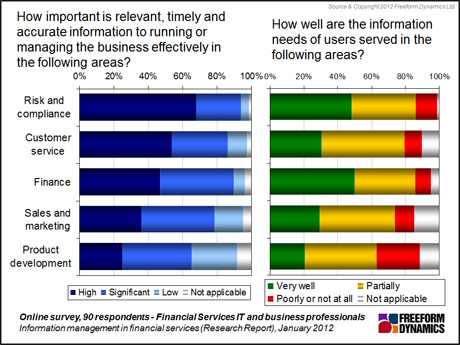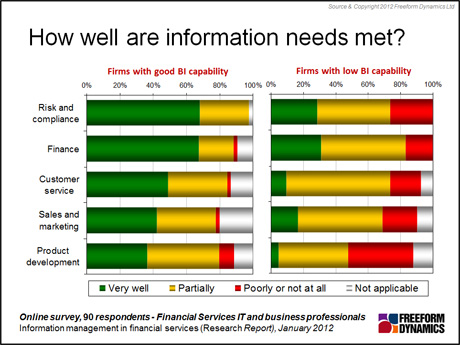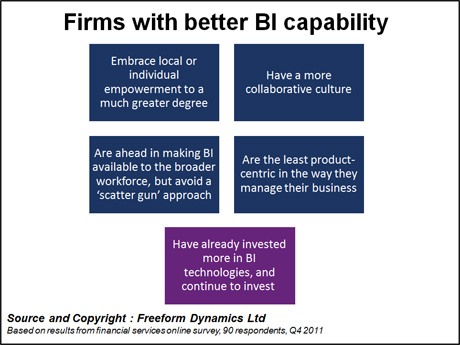In a world of increasingly devolved decision making, few would disagree that it’s important to make the right information available to the right people at the right time. Equally, few would disagree that it’s hard to actually make this happen. This was echoed in a recent online survey, where we asked financial services IT professionals about their priorities, challenges and successes when it comes to information management. Their responses clearly point to a discrepancy between what’s regarded as important, and companies’ ability to deliver (Figure 1). At the same time, they provide insight into what differentiates those that have done better at meeting the information management challenge from those that are continuing to struggle.

Figure 1
The chart in Figure 1 only tells part of the story, though. While we can see that the level of importance accorded to good information provision is greater than firms’ ability to deliver, the numbers shown hide the fact that there are actually significant differences between companies who have had much greater success at ensuring that people in the business get the information they need, when they need it, and those companies that are struggling to make it happen. The size of the gap can be seen in Figure 2.

Figure 2
So what distinguishes the ‘information winners’ from the ‘information losers’? When we investigated which factors set the two groups apart, we noted that the firms with good business intelligence (BI) capability have made much greater progress when it comes to addressing the fundamentals of information management. These include (but aren’t limited to):
• Ensuring that the required data are actually captured in the first place
• Improving access to, and collation of, data held in different source systems
• Resolving data conflicts
• Making data available in a timely manner
• Cutting down on the uncontrolled use of spreadsheets
Having identified these factors, we looked at whether the ‘information winners’ had other characteristics in common. What we found shows clearly that there’s a strong correlation between company culture and the way the business is run, and information management success (Figure 3).

Figure 3
Another important finding is that investment in BI-related technology pays off. And while the survey was conducted in just one industry sector, the observations we made and the lessons that can be drawn from them are equally applicable to organisations anywhere.
The fact that they are doing better, though, doesn’t mean that the companies with better BI capabilities can rest on their laurels. To date, the focus has been very much on regulation and compliance, and meeting the needs of the finance department. But those numbers show that BI success can be achieved if the company really wants to make it happen. The focus for the ‘winners’ should now be on applying the same principles and effort to those areas of the business that contribute directly to the acquisition and retention of customers.
Those that are still struggling will need to go back to basics. First and foremost is the recognition that spending on technology will not pay off if the non-technology barriers to effective information delivery aren’t addressed. These barriers vary between companies, but typically include product and/or departmental silos, disjointed processes, systems and data stores, and data ownership issues.
The next step involves taking an unflinching look at how the company operates, and identifying the biggest barrier, or set of barriers. Equally important is to ensure that business and IT are engaged. While technology has a key role to play, and IT professionals bring important skills and expertise to the table, it is simply not realistic for any business to expect that IT can solve the information management challenge on its own.
But there is good news: once the decision has been taken to remove obstacles to effective information provision, it’s often possible to demonstrate quick wins, leveraging existing technology. This can then open the door to increased investment in the technologies that – if chosen and implemented well – will lead to further improvements.
Last, but by no means least, it is important for all organisations to extend effective information management beyond the ‘must have’, i.e. meeting the needs of risk and compliance, and the finance department. In particular in the current economic climate, it is crucial that areas which contribute directly to customer acquisition and retention are served better than they currently are.
Interested in more details? The full report is available for free download here.
CLICK HERE TO VIEW ORIGINAL PUBLISHED ON

Through our research and insights, we help bridge the gap between technology buyers and sellers.





Have You Read This?
From Barcode Scanning to Smart Data Capture
Beyond the Barcode: Smart Data Capture
The Evolving Role of Converged Infrastructure in Modern IT
Evaluating the Potential of Hyper-Converged Storage
Kubernetes as an enterprise multi-cloud enabler
A CX perspective on the Contact Centre
Automation of SAP Master Data Management
Tackling the software skills crunch